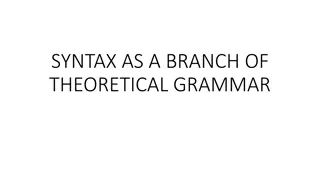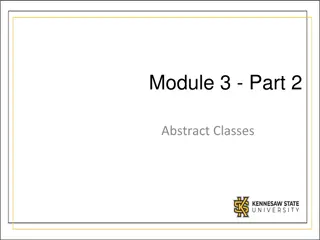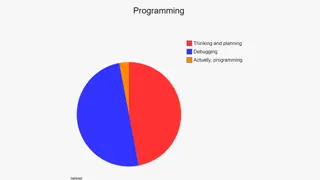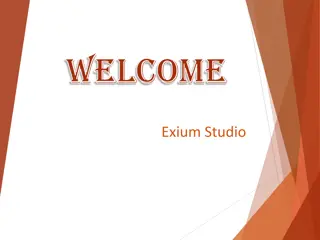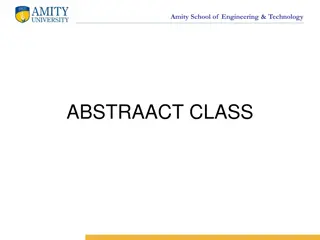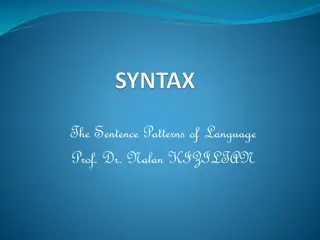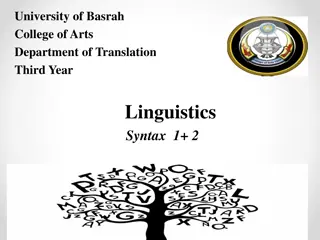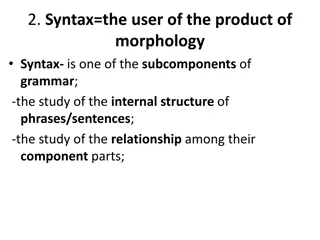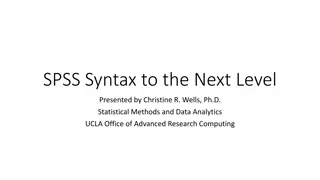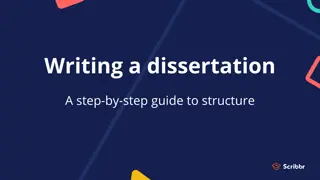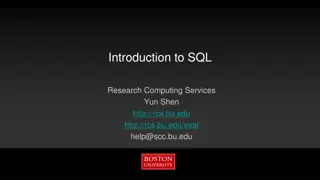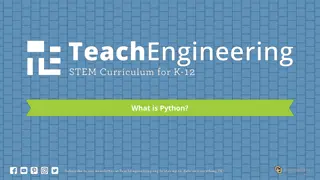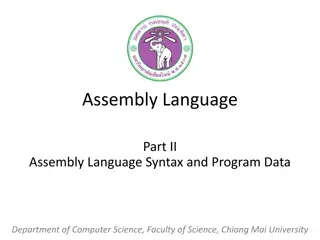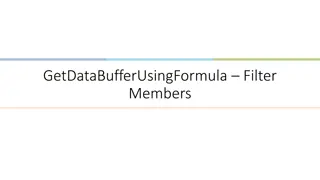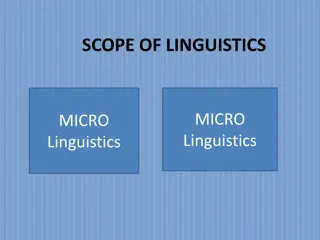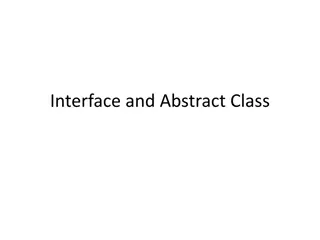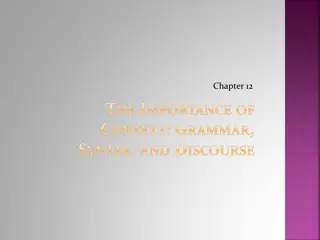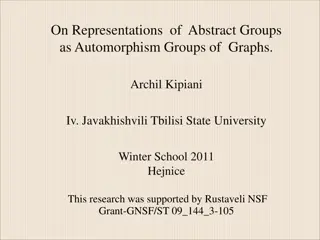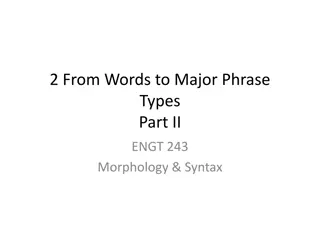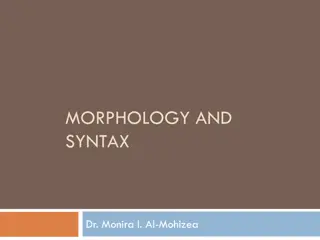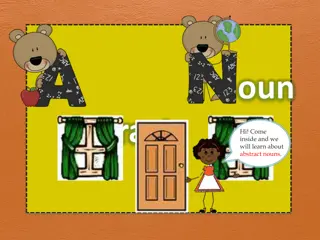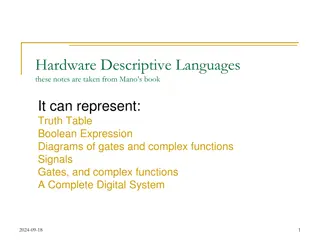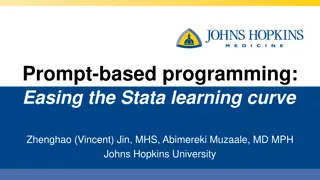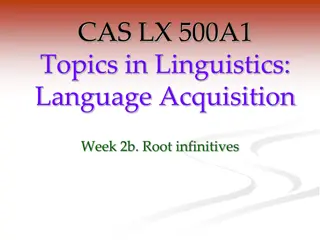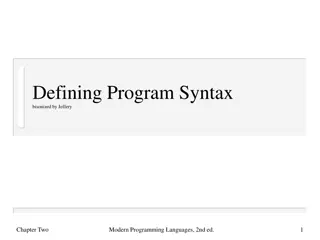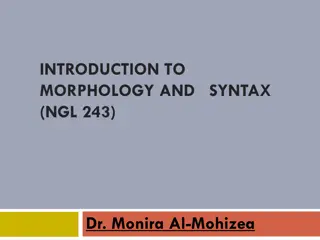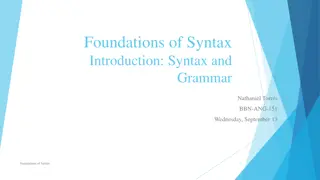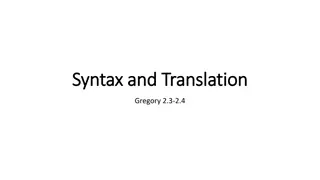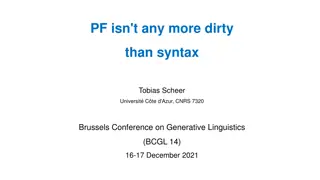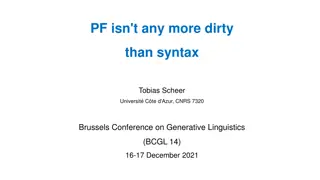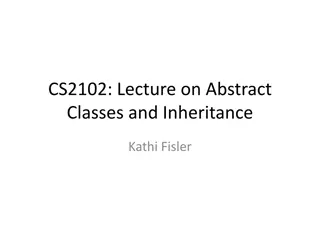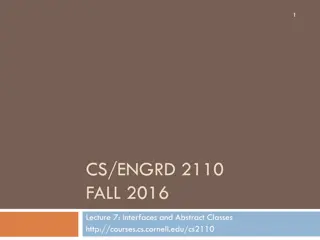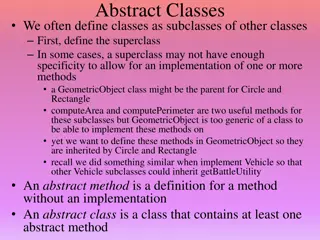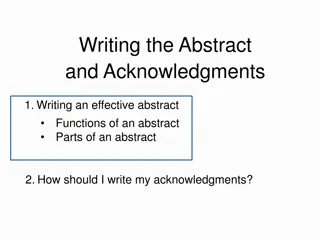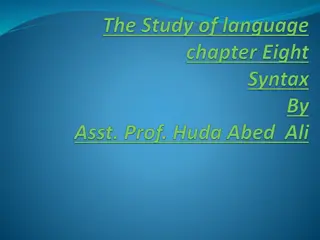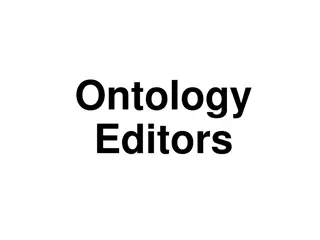Understanding Syntax in Theoretical Grammar
Syntax, as a branch of theoretical grammar, explores the combination of words in phrases and sentences, focusing on their relationships and functions in communication. Basic syntactic notions, such as syntactic units, syntactic meaning, and syntactic relations, play a crucial role in shaping the str
5 views • 17 slides
Understanding Abstract Classes and Inheritance in Object-Oriented Programming
Inheritance in object-oriented programming allows for reusing proven and debugged high-quality software through abstract classes. Abstract classes serve as superclasses and cannot be instantiated, instead, they force child classes to implement specific methods. Concrete and abstract methods can coex
6 views • 15 slides
Understanding Language Syntax Through Syntax Trees
Explore how both programming languages and spoken languages can be parsed into syntax trees, revealing the syntactic structure of sentences. Learn about terminals and non-terminals in syntax trees and how they represent different components of language. Dive into syntax tree abstraction for a deeper
3 views • 32 slides
Are you looking for Abstract Tattoos in Oratia?
Are you looking for Abstract Tattoos in Oratia? At Exium Studio, we take pride in our holistic approach to tattoo art, ensuring a unique experience for each client. Located in Henderson Valley, we provide a tranquil setting surrounded by nature for private tattoo sessions. Exium Studio offers a dive
0 views • 6 slides
Understanding Abstract Classes in C++ and Java
Abstract classes play a crucial role in C++ and Java programming. In C++, a class with at least one pure virtual function becomes abstract, while in Java, the 'abstract' keyword is used to define an abstract class. This article discusses the concept of abstract classes, their key characteristics, ex
0 views • 33 slides
Understanding Sentence Patterns in Language: A Guide by Prof. Dr. Nalan Kiziltan
Language consists of sentences organized by grammar rules. Syntax plays a crucial role in sentence structure. This guide explores sentence patterns, syntax principles, linear order, and hierarchical structure in language, illustrated with examples and constituent tests.
1 views • 111 slides
Understanding Syntax in Linguistics
Syntax, originating from Greek meaning arrangement, deals with the structure of sentences in a language. Generative Grammar, coined by Noam Chomsky, uses rules akin to mathematics to create new, grammatically accurate sentences. By applying recursion and deep structure analysis, linguists explore th
2 views • 20 slides
Understanding Syntax and Grammar Components
Syntax is a vital subcomponent of grammar that involves studying the internal structure and relationship of phrases and sentences. Grammar components include Lexicon/Vocabulary, Phonological Form, Syntactic component/Grammar, and Logical Form. Constituents are parts that combine to form a whole stru
2 views • 40 slides
Enhancing Writing Skills with Abstract Nouns in English Learning
Explore the concept of abstract nouns through engaging activities in English learning. Watch videos, practice converting adjectives, and craft a descriptive paragraph using abstract nouns to elevate your writing. Enhance your language skills and creativity with this interactive learning approach.
0 views • 7 slides
Mastering SPSS Syntax for Advanced Data Analysis
Delve into the world of SPSS syntax with this workshop by Christine R. Wells, Ph.D., where you will learn to efficiently work with SPSS commands and subcommands, understand when commands execute, and optimize your data analysis process. Discover insider tips on setting options, using SPSS version 28
2 views • 141 slides
Effective Dissertation Writing: Step-by-Step Guide to Structuring Your Work
Crafting a dissertation involves various essential components, from understanding what a dissertation is to structuring its sections like front matter including the title page, acknowledgements, and abstract. It's crucial to follow guidelines, especially for the sections' variations based on your fi
0 views • 32 slides
Learn SQL Basics: History, Syntax, and Terminology
SQL (Structured Query Language) is a specialized domain-specific language for managing structured data in relational databases. Developed in the 1970s, it follows a rigid syntax and structure, with specific features like triggers and stored procedures. Understanding SQL history, terminology, and syn
1 views • 38 slides
Understanding Python Programming Basics
Python is a popular high-level programming language known for its simple syntax, making it easy to learn and versatile for various applications. This introduction covers the basics of Python, including variables, objects, classes, and essential syntax rules like defining functions. Dive into the fun
2 views • 12 slides
Understanding Exceptions in Computer Science
Errors in programming, such as syntax, semantic, runtime, and logical errors, can disrupt the execution of a program. Syntax errors relate to grammatical violations, semantic errors occur when statements lack meaning, and runtime errors happen during program execution due to illegal operations. By i
1 views • 35 slides
Introduction to Assembly Language Syntax and Program Data
Learn about the syntax of assembly language and how data, variables, and constants are used in programming. Explore the basic instructions and the translation of high-level language into assembly language. Discover the role of an assembler in translating assembly language programs into machine langu
4 views • 36 slides
Understanding GetDataBufferUsingFormula.Filter.Members Syntax
GetDataBufferUsingFormula.Filter.Members provides a powerful way to filter account-type dimensions efficiently using formulas. This technique allows for precise filtering without the need to loop through individual members. Learn how to apply FilterMembers syntax to enhance data processing and achie
1 views • 6 slides
Overview of Micro and Macro Linguistics
Micro linguistics focuses on the scientific study of speech sounds, word formation, syntax, and meaning within a language, while macro linguistics delves into the societal, psychological, and neurological aspects of language use. Micro linguistic areas include phonetics, phonology, morphology, synta
1 views • 7 slides
Understanding Interfaces and Abstract Classes in Java
Interfaces and abstract classes play a crucial role in Java programming by defining contracts and blueprints for classes to implement. Interfaces provide a way for classes to declare their capabilities, while abstract classes allow for partial implementation. This article explains the concepts of in
1 views • 19 slides
Understanding Mathematics Through Concrete Pictorial Abstract Approach
Utilizing the Concrete Pictorial Abstract (CPA) method in teaching mathematics can help children grasp abstract concepts by starting with concrete objects, moving to pictorial representations, and then to abstract symbols. This approach aids in building a strong foundation in math, making it easier
0 views • 18 slides
Understanding Grammar, Syntax, and Discourse in Biblical Texts
Explore the significance of context in analyzing grammar, syntax, and discourse in biblical Greek and Hebrew texts. Learn about the foundational elements, word order, Greek syntax basics, and the importance of discourse analysis. Delve into the definitions of grammar, syntax, and discourse, and unde
1 views • 30 slides
Representation of Abstract Groups through Graphs
Explore the representation of abstract groups as automorphism groups of graphs, touching on topics such as the existence of graphs whose automorphism groups are isomorphic to given abstract groups, the cardinality of connected graphs satisfying specific properties, and questions regarding the cardin
0 views • 16 slides
Understanding Grammar Structures in Morphology and Syntax
Exploring the relationship between words and major phrase types in English morphology and syntax, this content delves into grammar with lexical categories, constituent structures, and the formation of phrases. It highlights the importance of considering constituents and word grouping for accurate sy
0 views • 35 slides
Understanding Morphology and Syntax in English Language
This content explores morphology and syntax in English language, covering topics like conversion, compounding, and the formation of words through various linguistic processes. It delves into examples of verb-noun conversions, productive word formation methods, and compound words. The discussion also
0 views • 27 slides
Exploring Abstract Nouns Through Examples and Practice
Dive into the world of abstract nouns with this interactive lesson featuring definitions, examples, and sentences demonstrating their use. Enhance your understanding of language and become a better writer through grasping the concept of abstract nouns.
0 views • 17 slides
Understanding Hardware Descriptive Languages in Digital Systems
Hardware Descriptive Languages (HDLs) are used to represent various aspects of digital systems, including truth tables, Boolean expressions, gate diagrams, and complex functions. They find application in design entry, logic simulation, functional verification, circuit synthesis, timing verification,
0 views • 19 slides
Enhancing Stata Learning with Prompt-Based Programming
Explore the benefits of prompt-based programming in easing the learning curve of Stata software. This innovative approach simplifies syntax, reduces errors, and enhances efficiency for data analysis tasks. By comparing prompt-based versus traditional syntax methods, researchers can improve their ski
1 views • 54 slides
Language Development in Children: Morphology and Syntax Acquisition
Children's language acquisition process involves developing morphology by adding inflectional morphemes to nouns and verbs, such as "-ing" and "-s" for plurals. Overgeneralization occurs as children apply rules, leading to expressions like "foots" and "mens". Additionally, irregular plurals and poss
0 views • 13 slides
Syntax in Language Acquisition: Root Infinitives and Small Clause Hypothesis
Children's syntactic development in language acquisition progresses from one-word utterances to combining words into basic sentences. This stage shows missing elements like tense, subject agreement, and auxiliary verbs. The Small Clause Hypothesis suggests that children initially lack certain struct
0 views • 52 slides
Understanding Programming Language Syntax
This content delves into the fundamental aspects of programming language syntax, covering lexical analysis, syntax rules, and semantics. It also explores how grammar works by building parse trees, providing examples from English grammar and programming languages. The use of Backus-Naur Form (BNF) an
0 views • 43 slides
Understanding Morphology and Syntax with Dr. Monira Al-Mohizea
Explore the fascinating realm of morphology and syntax in language with Dr. Monira Al-Mohizea's insightful guide. Learn about the internal structure of words, morphemes, and the aim of morphology to uncover subconscious knowledge. Delve into discussions on what constitutes a word and various definit
0 views • 19 slides
Understanding the Foundations of Syntax in Language
Delve into the basics of syntax and grammar, exploring the essence of language, syntax rules, morphemes, and morphemic decomposition. Discover how syntax shapes meaningful communication and learn to identify morphemes in English words.
1 views • 17 slides
Understanding Syntax and Translation in Logic
Explore the world of syntax and translation in logic through topics such as forming well-formed formulas, identifying main connectives, De Morgan's Laws, Venn diagrams, necessary and sufficient conditions, and more. Discover the language of logic, vocabulary, truth-functional connectives, punctuatio
0 views • 46 slides
Exploring Minimalism in Linguistics: Dirty PF and Clean Syntax
This text delves into the relationship between syntax and PF (Phonological Form) in the context of minimalism theory in linguistics. It discusses how minimalism aims to achieve clean syntax by discarding imperfect elements, with PF often considered as "dirty" due to its association with phonology. T
0 views • 40 slides
Minimalist Approach to Syntax and Phonology in Linguistics
The discussion delves into the relationship between syntax and phonology in linguistics, emphasizing the minimalist approach that aims to create a clean syntax while considering phonology as an ancillary element. It explores the idea that syntax is central to grammar, while phonology is considered '
0 views • 40 slides
Understanding Abstract Classes and Inheritance in Java
Explore how to utilize abstract classes and inheritance in Java programming to share common code across classes. Learn through examples involving animals like Dillo and Boa, and discover the concept of creating helper methods and abstract classes to abstract common features efficiently.
0 views • 31 slides
Understanding Interfaces and Abstract Classes in CS/ENGRD.2110.FALL.2016
This content covers the concepts of interfaces and abstract classes in a computer science/engineering lecture, discussing the implementation of shapes, method overriding, and the role of abstract classes in preventing instantiation. Various challenges and solutions related to abstract classes and me
0 views • 26 slides
Understanding Abstract Classes in Object-Oriented Programming
Abstract classes serve as blueprints for subclasses in object-oriented programming, allowing for shared functionality while ensuring specific methods are implemented in subclasses. By defining abstract methods and classes, programmers create a foundation for inheritance, polymorphism, and structured
0 views • 25 slides
Mastering Abstract Writing for Effective Research Communication
Learn the essential functions and parts of an abstract, including how to craft a clear and compelling abstract to attract readers to your full article. Explore tips on orienting readers, structuring content, and avoiding common pitfalls in abstract writing.
0 views • 20 slides
Understanding Grammar and Syntax in Linguistics
Grammar and syntax are two fundamental components of language study. Grammar entails rules for correct language usage, while syntax focuses on sentence structures. Deep and surface structures, along with examples and distinctions between active and passive voice sentences, are explored. Structural a
0 views • 21 slides
Comprehensive Guide to Ontology Editors and IDEs for Ontologies
Explore a wide range of Ontology Editors and Integrated Development Environments (IDEs) for managing ontologies efficiently. From simple text editors to advanced IDEs like Protégé and Web Protege, learn about various tools and syntax options available. Dive into Ontology Editors like Protégé 4.3
0 views • 16 slides
